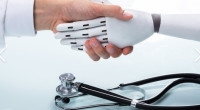A Critical look at “AI Revolutionizes Medicine” – The rapid advancement of artificial intelligence (AI) in the medical field is poised to revolutionize healthcare, not replace doctors. However, researchers emphasize that comprehensive ethical guidelines are crucial before AI fully integrates into medical practice.
AI’s potential in medicine is evident in its ability to detect tumors in mammograms with the same accuracy as human radiologists and evaluate organs prior to transplantation. These advancements have sparked discussions about the future of medicine, with AI playing an increasingly prominent role.
Despite continuous development, AI in medicine still faces significant limitations. Additionally, concerns regarding patient privacy are growing, particularly as many AI programs are developed by tech giants known for their lax data protection practices.
Mihaela van der Schaar’s Vision of a Human-Centric AI Revolution
Mihaela van der Schaar, a renowned professor at Cambridge University, advocates for a “reality-centric AI” approach to the AI revolution. She envisions a future where AI seamlessly integrates with human intelligence, amplifying our capabilities rather than replacing us.
According to van der Schaar, achieving this harmonious coexistence requires ensuring the data used to train AI models is truly representative, fair, and diverse. This will help mitigate biases and ensure AI’s decisions align with human values. Additionally, rigorously testing machine learning models is crucial to enhance their trustworthiness and safety.
Van der Schaar emphasizes that AI’s primary role should be augmenting human intelligence, not supplanting it. She envisions AI as a personalized coach, guiding individuals to acquire new skills, expand their knowledge, and make informed decisions.
In essence, van der Schaar’s vision is one where AI empowers humanity, transforming us into more capable, informed, and well-rounded individuals. This human-centric approach is essential for navigating the AI revolution responsibly and ensuring a future where AI complements, not replaces, human intelligence.
What Research Says
A recent study involving over 55,000 women’s mammograms revealed that replacing one radiologist with AI for independent screening interpretation led to a 4% increase in cancer detection compared to radiologist double reading.
Despite this promising finding, Mihaela van der Schaar, a prominent AI expert, maintains that human doctors will always play a crucial role in medicine. She envisions a future where AI complements and empowers clinicians, rather than replacing them.
For instance, AI can excel at identifying specific anomalies in radiology, while humans possess a broader range of diagnostic capabilities. Therefore, a collaborative approach between AI and human doctors is essential for optimal patient care.
Van der Schaar emphasizes that AI’s integration into healthcare should not lead to a dehumanized medical experience. She advocates for a human-centric approach where AI augments human intelligence, ensuring that patients receive comprehensive and compassionate care.
A 2022 study published in Gastroenterology highlights the potential of AI to empower clinicians. It demonstrated that AI-assisted colonoscopies could significantly reduce the risk of missing neoplastic lesions, the primary cause of post-colonoscopy colorectal cancer. Considering that an estimated one in four lesions are missed during screening, AI could be instrumental in saving lives.
Giovanni Briganti, an AI and Digital Medicine expert, concurs that AI is unlikely to replace human doctors. He asserts that replacing doctors with AI systems is a fundamental misunderstanding of healthcare delivery. Healthcare, he explains, is not solely about computer systems; it is about human interaction and the human touch.
In essence, the future of medicine lies in a synergistic alliance between AI and human expertise. AI can enhance diagnostic accuracy, streamline workflows, and provide clinicians with valuable insights, while human doctors offer empathy, critical thinking, and the ability to form patient-centered relationships. This collaborative approach holds the key to unlocking the transformative potential of AI in healthcare.
The Hidden Risks of AI in Medicine, Even with Perfect Models
Despite the promise of AI to revolutionize medicine, there are inherent risks that must be carefully considered. Giovanni Briganti, an expert in AI and Digital Medicine, highlights several potential pitfalls.
One concern is the issue of adoption. Even if a flawless AI model exists, its effectiveness can be compromised if not implemented effectively. This underscores the importance of thorough testing and validation of AI models before real-world deployment.
Another risk arises from the potential for AI models to lose their accuracy when applied in new environments. Briganti emphasizes the need for rigorous testing and validation of AI models to ensure their generalizability and robustness across different settings.
A 2023 report by the Brookings Institution identified injuries and errors as a major concern associated with the use of AI in medicine. While medical mistakes are inevitable, patients and healthcare providers may react differently when harm results from software rather than human error. Additionally, the widespread adoption of AI amplifies the potential impact of errors, as a single problem in a system could affect thousands of patients.
Mihaela van der Schaar, a leading AI researcher, raises concerns about the pervasive biases present in the data used to train AI models. She warns that machine learning algorithms can inadvertently perpetuate these biases, leading to unfair and discriminatory outcomes. To address this issue, her lab transforms biased data into fair synthetic data for machine learning training.
Another approach, known as data-centric machine learning, focuses on understanding the underlying data and its diversity, rather than solely on building predictive models. This approach aims to develop AI systems that are more robust to biases and produce more equitable outcomes.
Who Governs the Ethical Landscape of AI in Medicine?
The rapid advancement of AI in medicine necessitates the establishment of clear ethical guidelines to ensure its responsible and beneficial application. Giovanni Briganti, an AI expert, advocates for the development of “clear ontological guidelines on how a doctor should behave when using AI.” However, the question arises: who bears the responsibility for formulating these guidelines?
The current landscape of AI development is dominated by large tech companies, raising concerns about privacy and data ownership. A 2018 survey revealed that only 11% of Americans were willing to share their health data with tech companies, compared to a significantly higher 72% who were comfortable sharing it with their physicians. This disparity highlights the public’s trust deficit in tech companies’ handling of sensitive personal information.
Several lawsuits have already been filed against large healthcare systems and AI developers over data-sharing practices. These legal challenges underscore the urgency of establishing robust ethical frameworks to govern the collection, use, and protection of patient data in the context of AI-driven healthcare.
Mihaela van der Schaar, a prominent AI researcher, emphasizes that while AI developers bear the responsibility for creating safe, reliable, and integrable AI systems, they are not ethicists. Therefore, collaboration between AI developers and clinicians is essential to develop comprehensive ethical guidelines for AI in medicine.
She cites organ transplantation as an example of a critical area where AI can play a role, but where ethical considerations extend far beyond the realm of machine learning algorithms. Decisions regarding organ allocation involve complex ethical dilemmas that require human judgment and deliberation.
Schaar outlines three key aspects that ethical guidelines for AI in medicine should address: safety, trustworthiness, and interpretability. Ensuring the safety of AI systems when applied to populations that differ significantly from those used in their training is paramount. Additionally, AI systems should be transparent and their recommendations easily understandable by both clinicians and patients, empowering them to make informed decisions.
AI: A Beacon for Early Disease Diagnosis and Prevention
Despite legitimate concerns about the potential pitfalls of AI in healthcare, its potential benefits for patients are undeniable. Google has developed a remarkable program capable of predicting the onset of acute kidney injury two days in advance, a stark contrast to the current standard of detection that only occurs after the condition has manifested.
In the United Kingdom, researchers are diligently testing organ quality assessment technology that empowers doctors to determine an organ’s suitability for transplantation. This breakthrough could significantly increase the pool of liver and kidney donor organs available for life-saving procedures.
But AI’s capabilities extend beyond diagnosis; it holds immense promise in disease prevention. Mihaela van der Schaar, a leading AI researcher, envisions AI playing a pivotal role in identifying individuals at risk of developing diseases. With the growing popularity of wearable devices, healthy individuals can access a wealth of data from various sensors, providing insights into nutrition, environmental factors, pollution levels, and other crucial determinants of health.
“Understanding how these factors evolve over time and how they impact specific subpopulations is essential for comprehending the origins of disease,” van der Schaar explains. “Once we grasp these underlying mechanisms, we can begin to devise effective preventive strategies.”
Giovanni Briganti, an AI expert, views AI as an indispensable tool for personalized medicine, a healthcare approach that tailors medical decisions and interventions to the unique needs of each individual patient. He emphasizes that AI’s ability to analyze vast amounts of data and identify patterns allows for highly personalized predictions, paving the way for a more precise and effective approach to healthcare.
AI: Empowering Doctors by Streamlining Administrative Tasks and Enhancing Learning
While AI is unlikely to replace the expertise and human touch of doctors, it can significantly enhance their day-to-day work by automating administrative tasks and facilitating continuous learning. ChatGPT, a large language model, holds the potential to revolutionize healthcare administration by handling scheduling, appointment reminders, patient correspondence, and other time-consuming tasks.
This automation is already being implemented in some clinics, where AI-powered systems seamlessly transcribe patient appointments directly into electronic health record software, streamlining the documentation process and reducing administrative burdens for doctors.
In addition to streamlining administrative tasks, AI can also play a crucial role in accelerating the learning curve for medical students and doctors seeking to expand their knowledge in specific domains. Giovanni Briganti, an AI expert, envisions AI-powered systems serving as personalized tutors, providing guidance, answering questions, and recommending relevant resources to enhance medical professionals’ knowledge and expertise.
By automating administrative tasks and fostering continuous learning, AI can empower doctors to focus on what they do best: providing patient care, making informed clinical decisions, and building patient-doctor relationships. This shift towards a more patient-centric practice will undoubtedly benefit both healthcare providers and patients alike.
Continue to check our website for more articles of this kind. And, please use our comment section as well, we would love to hear from you.








